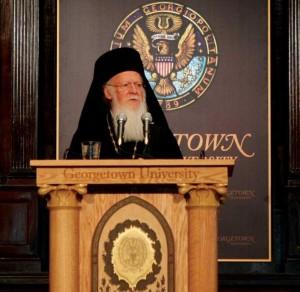The spiritual leader of the Christian Orthodox Church, Ecumenical Patriarch Bartholomew I, Archbishop of Constantinople, called for health care to be made available to the poor in a lecture in Gaston Hall on Tuesday.
His visit to the university, which was preceded by a meeting with President Obama on Monday, was part of a 15-day visit to the United States, which began in New Orleans on Oct. 20.
In the midst of a nationwide health care reform debate, Bartholomew drew the importance of making high-quality health care affordable for the poor from the history of the modern hospital, which he said began in the Eastern Roman Empire.
“It is important to note that these institutions . were public institutions, free of charge and created for the public good,” Bartholomew said. “. But what may be more important, we owe to them the view that every member of society, from the greatest to the least, deserved the best quality health care available at the time.”
Calling Christianity “revolutionary,” Bartholomew praised social reforms based on Christian values of nonviolence, philanthropy and environmental protection.
“Let us, as the lawyers would say, make a disclaimer: By calling Christianity revolutionary, and saying it is dedicated to change, we are not siding with progressives – just as, by conserving it, we are not siding with conservatives,” he said. “The only side we take is that of our faith.”
On nonviolence, Bartholomew referred to the Bible and the work of Martin Luther King Jr.
“It was Dr. Martin Luther King Jr.’s doctrine of nonviolence in the face of evil that made the movement unstoppable by any human force,” he said. “It is one of the most powerful ideas known to man, and yet it did not come from man – in fact, for human beings, it is completely counterintuitive. Our first instinct is to strike back, not turnn the other cheek.”
He said King’s work in leading a civil rights movement through nonviolence was inspired by Gandhi, who was in turn inspired by “The Kingdom of God Is in You,” a book by Orthodox Christian and Russian novelist Leo Tolstoy.
“Although the patriarch did not explicitly express [it], [his view on nonviolence] reveals his view on terrorism I think,” said Demetiros Sdavrakas, an Orthodox Christian who lives in the D.C. area and attended the event.
John Podesta, a faculty member at the Law Center and the founder and head of the Center for American Progress, an organization which co-sponsored the event, introduced Bartholomew at the event and referred to his environmental work.
“The convening of his eighth international environmental symposium, which brought scientists, policy makers and theologians together on the banks of the Mississippi River last week, and his presence here on the on the banks of the Potomac bear witness to his continuing advocacy for ecological responsibility,” Podesta said.
Bartholomew, often called the “Green Patriarch,” is renowned for his advocacy for the environment.
“Our sin toward the world – the spiritual root of all our pollution – lies in our refusal to view life and the world as a sacrament of thanksgiving, and as a gift of constant communion with God on a global scale,” he said. “It is therefore appropriate for us to seek ethical and even legal recourse where possible, in matters of ecological crimes.”
Bartholomew suggested “asceticism” – an Orthodox Christian value, he said – as a way of protecting the environment.
“This asceticism requires voluntary restraint, in order for us to live in harmony with our environment,” Bartholomew said. “By reducing consumption – known in Orthodox theology as `encratia’ or self-control – we ensure that resources are left for others in the world.”
Podesta remarked in his introduction about the significance of the patriarch’s presence on campus.
“The presence of a leader who has worked not only for reconciliation of the Roman and Orthodox churches but also towards a broader dialogue with Jews and Muslims, signals that we can, and we must, unite in pursuit of both a better understanding of God’s planet and a more progressive order in the society that we create,” he said.”








